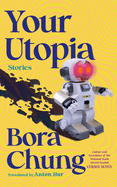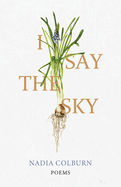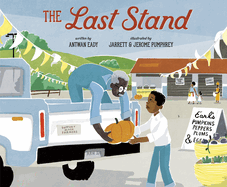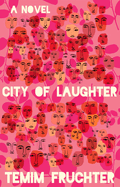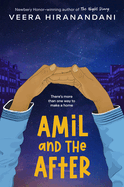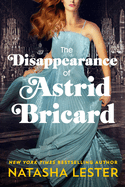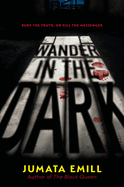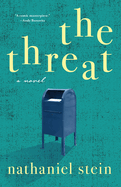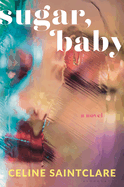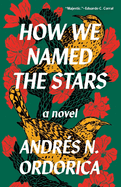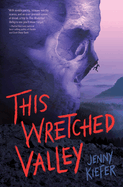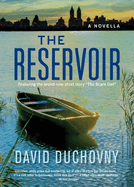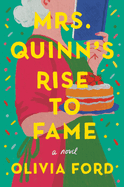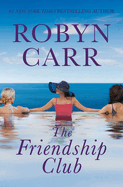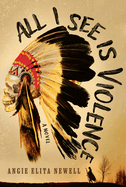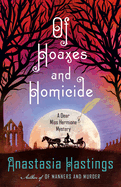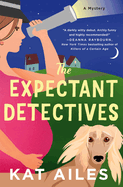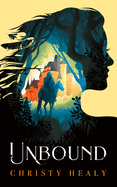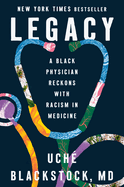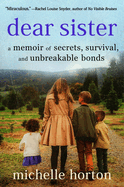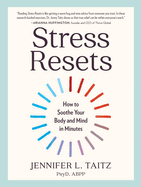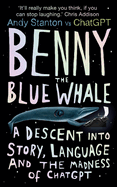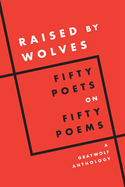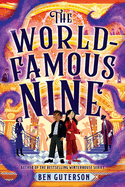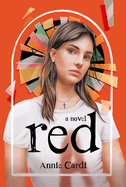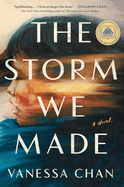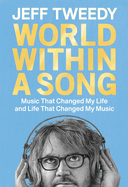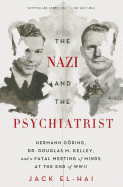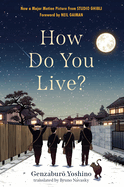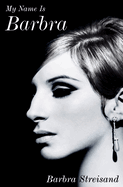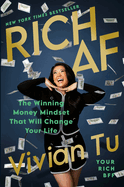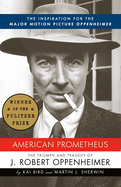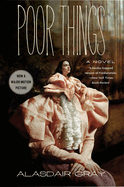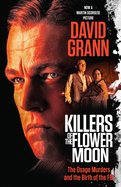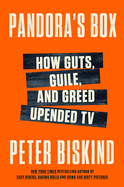Friday, February 2, 2024
Midwinter might be cold and harsh, but in today's newsletter, Stress Resets offers "evidence-based techniques for quickly diffusing moments of stress" from an experienced psychologist, and poet Nadia Colburn's collection I Say the Sky "may be the perfect accompaniment for the short days and long nights of winter." Additionally, the "openhearted" picture book The Last Stand, written by Antwan Eady and illustrated by Jarrett and Jerome Pumphrey, sends "a 'love letter' to Black farmers and the towns they serve."
For The Writer's Life, author/illustrator Vashti Harrison talks about big feelings and big wins related to her 2023 picture book Big, as the first Black woman to receive the Randolph Caldecott Medal.
Your Utopia
by Bora Chung, transl. by Anton Hur
Uncanny atmospheres and heartfelt human insights strike an unlikely balance in writer and translator Bora Chung's speculative short story collection Your Utopia, translated from the Korean with concise clarity by Anton Hur. In "The Center for Immortality Research," an office worker deals with seemingly banal workplace frustrations at a company with a dark secret. Chung's deft construction of amorphous unease continues in "A Very Ordinary Marriage," when a seemingly average suburban husband discovers that his wife is not who (or what) she's claimed to be. Meanwhile, in the titular "Your Utopia" and "Seed," humans attempt to colonize new lands in hopes of finding happiness, but underestimate the capacity for love in the beings they leave behind.
Like the stories in her National Book Award finalist Cursed Bunny (also translated by Hur), these eight tales are genre-bending thought experiments, but they lean more toward science fiction than horror. In focusing on technology, the possibilities of the future, and the unknowns of the universe, Chung lingers tenderly with the emotional depths of her stories, which arise almost unexpectedly as her characters navigate surreal, speculative, and often mundanely horrifying horizons. Often, Chung's characters--whether they are human, alien, or robot--are seeking connection, stuck lingering with their own loneliness in liminal settings: the bureaucratic nightmare of office hallways, a post-human world that is not yet extinct, an elevator shaft. But rather than casting these moments of suspension as simply horrifying (although many of them are), Chung's sensitive emotional awareness reveals these as spaces of potentiality, the places and moments where anything might still be possible. --Alice Martin, freelance writer and editor
Discover: Another unsettlingly prescient collection from speculative fiction writer Bora Chung, Your Utopia surprises and enlightens with its emotional acuity.
City of Laughter
by Temim Fruchter
The universal experience of determining who we are by asking where we came from turns specifically Jewish and queer in Temim Fruchter's tender debut. City of Laughter opens under a "perplexing clotted sky" in the city of Ropshitz, where a watchful messenger-cum-narrator begins weaving a story of family, ritual, and love. The novel is as much about the central thread running through Shiva (a grad student simultaneously grieving the death of her father and the end of her first relationship); her mother, Hannah (who carries a lifetime of inherited rites and unanswered questions); Hannah's mother, Syl (a birdwatcher with piles of journaled secrets who died the same day Shiva was born); and Syl's mother, Mira (a silenced girl who became a silent woman) as it is about the interstitial folktales--both real and Fruchter's own--braided through their lives. But almost more affecting than the story itself is its aching core, reminding readers "what families so often don't understand: that the stakes of memory are high."
In exquisite prose, City of Laughter dips in and out of a generational sadness "arcane and ancient, calling for reverence and grief all at once" as Shiva gives into her want to "ask questions with more precision" and journeys to Ropshitz, following the call of something she can't name but must answer. Readers will ponder how the weight of recollection and faith (the "genetics of wanting") ripple across lifetimes, even when those who came before try to still their yearning: "Some lifetimes are smooth and steady, but some are craggy and turbulent and parched. Some, like this one, are mutinous with want." This stunning debut heralds an author to watch. --Kristen Coates, editor and freelance reviewer
Discover: This affecting debut considers four generations of yearning and faith in a Jewish family, and showcases the weight of memory and love.
The Disappearance of Astrid Bricard
by Natasha Lester
In her stunning ninth novel, The Disappearance of Astrid Bricard, Natasha Lester paints a dynamic portrait of three fashion icons--mother, daughter, and granddaughter--and highlights what is lost when women are relegated to the roles of model and muse.
Astrid Bricard arrives at Parsons School of Design in the 1970s, ready to make her mark on the fashion world. Her birth mother, Mizza, best known for being Christian Dior's assistant and muse, has been an occasional presence at best in Astrid's life. When Astrid meets fellow rising star Hawk Jones, their romance and the resulting designs become instant tabloid fodder, but the publicity may scupper Astrid's chances of building her own career. In the present day, Astrid and Hawk's daughter, Blythe, finds herself at a French villa with her ex-husband's family, facing a crossroads in her life and career.
Lester takes readers deep into all three women's stories, detailing Astrid's highs and lows (including her iconic silver lamé dress); Mizza's triumphs and privations in Nazi-occupied Paris; and Blythe's modern-day struggles with solo parenting, her own ambitions, and unanswered questions about her past. Readers gradually learn the truth behind Astrid's disappearance following a "Fashion Battle" at the Palace of Versailles, and the ways in which all three women fought to hold onto their identities and have their work recognized. Lester's novel, like its heroines, is many things at once: a juicy fashion-insider story, a lushly described couture journey, a blazing indictment of sexism in the fashion industry, and a tribute to bold, tenacious, creative women. --Katie Noah Gibson, blogger at Cakes, Tea and Dreams
Discover: Natasha Lester's dynamic ninth novel follows the intertwined fashion careers of three generations of bold, brilliant, tenacious Bricard women.
The Threat
by Nathaniel Stein
Nathaniel Stein, writer for the New Yorker, dishes up an inventively absurdist dark comedy in The Threat, the story of an unassuming middle-aged man whose life goes farcically off the rails.
Melvin Levin is a single, conscientious, rule-following 41-year-old with a bad back. He lives alone, and his social circle consists largely of an elderly neighbor, upon whom he bestows good deeds. One night while Melvin is anticipating a promotion at his totally nondescript job, the boring, dull routine of his life is suddenly overturned when he receives a "plain little note" in the mail: "Mr. Melvin Levin, I'm going to kill you," the note begins. "You've worn out my patients for the last time and your through...." The unelaborate note, complete with poor grammar, becomes like a "flag planted atop the mountain of bad luck" that is Melvin's life. The threat produces a ferocious sense of anxiety in Melvin, who--having lived with "unerring politeness" and an "unceasing, almost superstitious rectitude, taking great pains to avoid rubbing people the wrong way"--struggles to decipher whom he might have wronged. Despite the chilling implications of the note, Melvin ultimately becomes empowered and excited by the idea of having an anonymous, formidable enemy, and he undergoes a hilarious life transformation.
Stein's clever first novel will charm readers; its simple premise snowballs into a side-splitting, thought-provoking meditation on how one man's seemingly inconsequential life finally overflows with grandiose meaning when faced with the prospect of death. --Kathleen Gerard, blogger at Reading Between the Lines
Discover: The Threat is a clever dark comedy about an unassuming man whose dull, stunted life takes wildly hilarious turns after he receives a death threat.
Sugar, Baby
by Celine Saintclare
In Celine Saintclare's enticing debut novel, Sugar, Baby, 21-year-old Agnes pays a steep price for living rent-free at the home of her deeply religious Caribbean mother. Subject to participation in weekly prayer meetings, early curfews, and work at the same cleaning agency as her mother, Agnes feels stuck. Then her mother kicks her out when she catches her sneaking in from a late night. Agnes turns to Emily, the daughter of one of her cleaning clients.
Emily's invitation to stay in her London flat, which she shares with a group of models, ushers Agnes into their sugar-baby lifestyle. Emily assures her that it's "easy once you learn how. I could show you how to make a career out of lunches and champagne, Agnes." Still unsure if she really fits the role, Agnes is swept into the unfamiliar mayhem of free tables, endless champagne, and head turns from every man in the room. Soon enough, she is graduating from seemingly harmless lunch dates to paid-for vacations, designer gifts, and an increasingly guilty conscience.
Saintclare presents an intimate look into the lives of sex workers--those who are in it for the thrill and those who are in it to survive. Saintclare's risqué narrative exposes the thin line between a woman using her body as a commodity and losing control of it. Without the safety net that the rest of the girls have, Agnes's unfiltered feelings toward sugaring are vulnerable, desperate, and often humorously honest. Her discernible anxiety toward her new lifestyle begs the question: How far is too far? --Clara Newton, freelance reviewer
Discover: Celine Saintclare's funny and risqué debut mixes the glamour and scandal of sex work to celebrate womanhood, beauty, and finding oneself.
How We Named the Stars
by Andrés N. Ordorica
Latinx poet, educator, writer Andrés N. Ordorica makes his fiction debut with How We Named the Stars, a searing coming-of-age, first-love story between two young men--one living, the other six weeks dead. Daniel de la Luna and Sam Morris began as strangers at their elite upstate New York college, where they were randomly assigned as roommates. While they share California roots, their backgrounds are markedly different: awkward "overthinker" Daniel, the son of Mexican immigrants, is the first of his family to pursue higher education, made possible by a full-ride academic scholarship; golden-boy Sam is privileged, white, a talented legacy on the soccer team, with easygoing, kind parents who ensure the boys' every comfort when they deliver Sam to campus. Over the school year, their relationship evolves from roommates to best friends to something more; their summer apart will separate them forever.
Fifteen years in the creating, the novel owes a debt to Waiting for Godot, according to Ordorica in his concluding author's note. He emphasizes that "this is not a memoir, and I am not Daniel," yet adds, "But the experiences that Daniel goes through, of being named after a family member he never met, and then losing a dear friend at the tender age of nineteen, are both truths that have shaped my own story." That empathy resonates on every page, although Ordorica can veer occasionally toward overwrought repetition and pedantic awkwardness. Minor stumbles aside, Ordorica affectingly ciphers stripped-bare emotions into a haunting tribute to love and survival. --Terry Hong, BookDragon
Discover: Andrés N. Ordorica's fiercely impassioned debut novel parses the intensely evolving relationship between two young men in their first year as roommates at an elite upstate New York college.
This Wretched Valley
by Jenny Kiefer
In Jenny Kiefer's mesmerizing horror tale, This Wretched Valley, two grad students and two climbers hike into the Kentucky forest to chart an undiscovered rock formation but find a nightmare instead. Six months after they go missing, the discovery of three of their bodies--one an impossibly pristine skeleton and the other two horrifyingly mutilated--creates a media frenzy of speculation and theories. The missing body of the fourth only deepens the mystery.
From this beginning, Kiefer rewinds the story to the moment Clay Foster, a doctoral candidate, assembles a small expedition to study a new rock formation he discovered using LiDAR technology. Along with fellow student Sylvia Burnett (soon to be known as "Sylvia Skeleton"), he invites Dylan Prescott, an up-and-coming rock climber, and her boyfriend, Luke, to ascend the rock. The quartet set up camp in the valley, unaware that it possesses an evil history and a deathless hunger for human blood.
Kiefer weaves these past stories with the group's present to create a daymare landscape of despair. Although Kiefer outlines the end of her characters at the outset, she cleverly makes the means of that end the fulcrum upon which the horror unfolds. The story, which alternates among the perspectives of each character, is a taut descent into madness as the valley refuses to let them go. With nods to The Blair Witch Project and Alma Katsu's The Hunger, Kiefer masters body and survival horror without sacrificing the nuanced notes of psychological disintegration in this impressive debut. --Peggy Kurkowski, book reviewer and copywriter in Denver
Discover: This debut horror novel brilliantly breaks down the fates of four friends who hike into a valley with a bloody past and a hunger that cannot be quenched.
The Reservoir
by David Duchovny
The Reservoir, David Duchovny's spry, wry, and inventive pandemic-set novella, dabbles in a host of genres--mystery, romance, black comedy, adventure--before ultimately circling back to dystopian fiction, a subset of sci-fi, the genre for which the X-Files actor turned novelist (Miss Subways) first became known.
This novella centers on Ridley, a divorced former Wall Streeter who has had time and money on his hands since his early retirement; that he has a distant relationship with his adult daughter isn't the pandemic's doing. From his apartment overlooking Central Park, Ridley has been diverting himself with his "time-lapse art project": before bed, he sets his iPhone on a windowsill facing the Central Park reservoir and activates the camera. One morning, he discovers that in the night, his phone captured flashing lights coming from a building across the park; it turns out the lights have appeared in other recordings as well. He chances an outing across the park in hopes of finding his "secret sharer."
Early on, Duchovny seems to be setting up a thriller--Ridley feels he "could star in his very own retrofitted-for-the-pandemic Rear Window"--but the novella gradually adopts an increasingly heightened reality. Throughout, The Reservoir remains a meditation on loneliness and the analgesic allure of self-deception. The book concludes with the short story "The Scare Owl," in which an owl rescues a baby crow that comes to see him as its father--in other words, another fiction that teases the discomfort of an adult male playing dad. --Nell Beram, author and freelance writer
Discover: This spry, wry, and inventive pandemic-set novella centers on a retired Wall Streeter who, from his Manhattan apartment, notices mysterious lights coming from a building across Central Park.
Mrs. Quinn's Rise to Fame
by Olivia Ford
Olivia Ford's warmhearted debut novel, Mrs. Quinn's Rise to Fame, traces the story of one woman's life through baking. At age 77, Jenny Quinn loves her quiet life with her husband, Bernard; he's an avid gardener, she's an accomplished baker, and they adore spending time with their niece, Rose, and her family. But, uncharacteristically, Jenny finds herself longing for something more. So she secretly applies to be a contestant on the popular TV show Britain Bakes, and--to her astonishment--she's accepted. Baking up a storm in preparation for the show, Jenny finds her recipes bring up lots of old memories--and some might have implications for her future.
Like Jenny's expertly crafted pastries, Ford's narrative layers in sweetness, rich flavors, and the occasional bit of salt. Readers get a taste of Jenny's youth through flashbacks: her grief over losing her mother, her close bond with her father, the first time she met Bernard at a dance. Gradually, over the course of the novel, Jenny confronts her most painful memory: a secret she's kept, even from Bernard, for nearly 60 years. As she competes on Britain Bakes, creating elaborate confections and bonding with the other bakers, Jenny struggles with whether to reveal her secret. Her eventual decision will have unforeseen implications but, as with her delectable desserts, the unexpected ingredients are critical in reaching a satisfying conclusion.
Compassionate, thoughtful, and full of mouthwatering descriptions, Mrs. Quinn's Rise to Fame is a tribute to kindness, following one's dreams at any age, and the deep joy and nourishment of baking. --Katie Noah Gibson, blogger at Cakes, Tea and Dreams
Discover: Olivia Ford's tender, delicious debut novel follows an elderly baking-show contestant as she reflects on her life through recipes.
The Friendship Club
by Robyn Carr
Readers will savor The Friendship Club, an inviting standalone novel by Robyn Carr (The Family Gathering), in which four Nevada women of varying ages--all associated with a popular cooking show--support each other through loneliness, life changes, and new love.
Each character is a food lover. Marni Jean McGuire is 57 years old and a popular TV chef--widowed, remarried, and now happily divorced. Her meddling daughter, Bella, is an assistant district attorney; she is overjoyed to be expecting a baby with her lawyer husband. She urges her mother to start dating again, which she also decides she will orchestrate. Then there is Ellen, the introverted, always-reliable producer of Marni Cooks, who is Marni's loyal older friend. Having spent the majority of her adult life caring for a severely disabled husband, now deceased, Ellen feels reinvigorated by a budding romance with a neighbor. Sophia Garner is a student intern working on Marni's show. Sophia's amorous involvement with a man whom she learns has a creepy, controlling dark side makes her suddenly feel homesick for her native Argentina. When Sophia's father, Sam, an agriculture teacher, meets Marni and offers advice on her vegetable-herb garden, his "kind spirit" and "strong heart" instantly appeal to Marni. Is romance best when sought out or when grown organically?
"Sustainable food is what binds families and communities and countries," says one character. And through the tender, graceful storytelling dexterity of Robyn Carr, so, too, does friendship, love, and romance. --Kathleen Gerard, blogger at Reading Between the Lines
Discover: The Friendship Club is a tender, unhurried novel about four foodie females--each at a crossroads--who support each other through life changes and new love.
All I See Is Violence
by Angie Elita Newell
Angie Elita Newell's All I See Is Violence is a historical novel about the Battle of Little Bighorn, colonization, and its cultural aftermath. The power and rawness of the story are head-spinning, but its grounded and breathing characters lead a clear and compelling narrative through the carnage, allowing Newell, who belongs to the Liidlii Due First Nation, to achieve moments of tenderness, clarity, and beauty.
In the first of three braided narratives, readers will come to love the novel's landscape through the eyes of Little Wolf, a young Cheyenne woman who must decide whether to fight--and kill--for her homeland. Here, Newell's descriptions come alive with the kind of prose that opens a doorway into snowy woods.
In a 1972 thread, Nancy Swiftfox raises a family descended from Little Wolf. She tries to navigate the racism and societal cruelty threatening to crush her and her four boys. The cultural backdrop is the American Indian Movement, which Nancy's son joins. He is a veteran struggling with his own trauma and participates in a protest at the site of the Wounded Knee Massacre.
The final part of the braid, set in the same time frame as Little Wolf's story, follows General Armstrong Custer in the days leading up to the Battle of Little Bighorn. But it's Nancy who powers the heart of the story as she tries to reckon with the ways her life is damaged by atrocity and generational trauma, seeking a way forward that might provide, if not healing for her and her family, at least survival. --Carol Caley, writer
Discover: Angie Elita Newell's All I See Is Violence, which weaves the stories of a Cheyenne warrior, a cold-blooded general, and a single mother, is a historical novel with characters that breathe.
Mystery & Thriller
Of Hoaxes and Homicide
by Anastasia Hastings
Of Hoaxes and Homicide, Anastasia Hastings's well-plotted second entry in the Dear Miss Hermione Mystery series, follows bluestocking Violet Manville (secretly writing as agony aunt Miss Hermione) as she unravels the secrets of a dangerous cult. After solving a mystery some months ago (Of Manners and Murder), both Violet and her younger half sister, Sephora, are bored. But when Sephora's friend Margaret joins a cult, and her mother writes to Miss Hermione in desperation, seeking help, Violet seizes the chance to investigate the mysterious Children of Aed. Left behind in London, Sephora (alongside the sisters' redoubtable housekeeper, Bunty) tries to assuage her worry about her friend by chasing down several promising leads. What the sisters uncover will surprise them both--especially when one of the cult members is murdered.
Narrated mostly by Violet, with occasional interludes in Sephora's voice, the plot mixes melodrama (including the adventures of a penny-dreadful author who styles himself Count Orlando) with a bit of romance (each sister gets her turn) and old-fashioned sleuthing. Violet, though given to self-congratulation and reflections on her travels through India with her late father, nevertheless proves a competent sleuth: observant, suspicious, meticulous, and (mostly) stealthy. As she investigates the cult members (hoping to prove Margaret is no murderer), she uncovers a nest of secrets and lies--but discovering which of those secrets led to murder is a more difficult task. Violet, assisted by mysterious American agent Eli Marsh, eventually solves the case, but the fun is in the puzzle-solving and the moments of high drama along the way. --Katie Noah Gibson, blogger at Cakes, Tea and Dreams
Discover: In her twisty second Miss Hermione mystery, Anastasia Hastings sends her bluestocking sleuth to a ruined abbey to investigate a dangerous cult.
The Expectant Detectives
by Kat Ailes
Most couples expecting their baby in two weeks would be readying a nursery, attending showers, and enrolling in prenatal classes. Not Alice and her boyfriend, Joe, in Kat Ailes's uber-witty debut, The Expectant Detectives. Instead, they move, along with their beautiful but dumb dog, Helen, into a house they saw online in a small Cotswolds town they've never visited.
They choose the "quiet market town" of Penton with its "posh hippy" vibe; it sounds safer and less expensive than London, about three hours away. Ailes's energetic, breezy style immediately establishes the personalities of Alice and Joe, who've been together just over a year. They do love each other and dote on Helen, despite her penchant for throwing up and burying spoons, but they are unprepared for parenthood, admitting to being "disorganized bordering on the chaotic."
Even before unpacking in the (naturally) too-small house, the couple joins a prenatal "crash course," held in an herb shop. Alice and Joe, while desperately needing to get serious about the pending birth, hope to make friends with other like-minded, unprepared expectant couples. Asked what she is most excited about for the birth, Alice mumbles: "the snacks?" During the second class, one woman gives birth while the store's co-owner is murdered downstairs. Alice joins other mothers-to-be in an investigation, fearing a neighbor or a resident of a nearby commune could be the murderer.
Ailes's strong sense of humor drives this clever novel--she includes a laugh-out-loud birthing scene--while keeping mildly violent scenes serious. --Oline H. Cogdill, freelance reviewer
Discover: In this witty debut, a couple expecting their first child in two weeks move to a small town where they are caught up in the murder of local shop owner.
Science Fiction & Fantasy
Unbound
by Christy Healy
Christy Healy brings "Beauty and the Beast" to medieval Ireland in Unbound, a sweeping romantic fantasy drenched in Irish lore and mythology. Rozlyn's birth brought a curse to her people--a terrible beast that terrorizes the kingdom by night. The only way to break the curse is if she marries a man who truly loves her, something that proves difficult as sheltered, embittered Rozlyn scares off all suitors--until she falls for Jamie, her seeming match in all ways. But he betrays her on her wedding night.
Unbound is not simply a gender-swapped retelling. In chapters that alternate between the past and the present, Healy weaves a tale of love and monsters, those inside and out of the castle. In the year 1006, flirtatious, determined Jamie slowly wins Rozlyn's heart with tales of terrifying beings, tragic romance, and heroic deeds. In 1017, a powerful, angry Rozlyn grudgingly accepts a truce with her estranged husband to defeat a threat neither can manage alone. They must face an awful truth as they work together and as the love they once shared flares back to life: Rozlyn holds the key to Jamie's people's salvation, but allowing him to take it will mean the end of her existence.
Readers will delight in Healy's world of dark legends and hard-won romance, with hints of both "Beauty and the Beast" and One Thousand and One Nights. Unbound sits perfectly on the shelf with other atmospheric, romantic fantasies, including those from Hannah Whitten, Ava Reid, and Lucy Holland. --Suzanne Krohn, librarian and freelance reviewer
Discover: "Beauty and the Beast" meets medieval Irish folklore in this inventive fantasy romance about a monstrous young woman who must decide how much she's willing to give up for love.
Biography & Memoir
Legacy: A Black Physician Reckons with Racism in Medicine
by Uché Blackstock
Uché Blackstock's incisive memoir, Legacy, charts her journey as a Black female physician while calling out the pervasive, systemic racism in American medicine. Blackstock and her twin sister, Oni, always knew they would be physicians like their mother, Dale, a Harvard Medical School graduate who spent decades caring for her community in Brooklyn. Both girls grew up with role models of dedicated Black female physicians, and both have pursued medicine as a career. But as Blackstock notes, neither their childhood nor their education gave them a full picture of the racism that permeates American medicine.
Blackstock traces her journey through medical school at Harvard, her residency back in Brooklyn, and her work specializing in ultrasound technology and curriculum. She calls out the toxic environment she later found at NYU School of Medicine, where she spent nearly 10 years practicing, teaching, and working on diversity initiatives. Throughout her narrative, Blackstock includes anecdotes of Black medical professionals who pioneered advances in medicine, Black patients treated badly by the system, and the tireless work of her colleagues of color to protect and care for their own communities. She gives a vivid account of her time working in urgent care during the Covid-19 pandemic, and her decision to found a health advocacy organization focused on correcting racial health inequities. Urgent and insightful, Blackstock's memoir is a fascinating account of her medical career and a clarion call to the American medical system to give Black patients the care they deserve. --Katie Noah Gibson, blogger at Cakes, Tea and Dreams
Discover: Physician Uché Blackstock's incisive memoir shares her experience as a Black female physician in the U.S. and calls on the medical industry to combat racism.
Dear Sister: A Memoir of Secrets, Survival, and Unbreakable Bonds
by Michelle Horton
Dear Sister: A Memoir of Secrets, Survival, and Unbreakable Bonds is a harrowing story, a call to action, and a love letter between two sisters.
In their 20s, Michelle Horton and her sister, Nikki, were very close, working together to raise Nikki's two children and Horton's son. Horton thought she knew everything about her sister's life, and so was entirely caught off guard by the emergency call. Her niece and nephew's father was dead. Nikki had killed him. He had been abusing her horrifically for years.
Following that news, Horton's life was consumed by the work of single-parenting three children while raising money for her sister's legal defense, becoming an amateur expert on criminal law and the psychology of abuse, and advocating for survivors' rights. The high-profile 2019 case of Nikki Addimando resulted in her conviction of second-degree murder and a sentence of 19 years to life in prison. Despite extensive evidence, the judge concluded that Nikki was not a victim of abuse.
Horton's narrative (with supporting evidence) is available elsewhere, but she additionally brings to her memoir a close, personal account of Nikki's trauma and that of the three children involved, the deep connection between sisters, and the continuing failure of the legal system to adequately handle abuse victims when they appear as criminal defendants. Dear Sister is not only Horton's story and Nikki's story, but also an urgent appeal for reform. Heartfelt, disturbing, but ultimately hopeful, this memoir is an important part of an ongoing conversation, and a tribute to sisterhood. --Julia Kastner, librarian and blogger at pagesofjulia
Discover: The heartbreaking story of a woman incarcerated for killing her abuser, told by her sister, highlights systemic wrongs and the resilience of a family in trauma.
Psychology & Self-Help
Stress Resets: How to Soothe Your Body and Mind in Minutes
by Jennifer L. Taitz
In Stress Resets: How to Soothe Your Body and Mind in Minutes, psychologist Jennifer L. Taitz (How to Be Single and Happy) shares evidence-based techniques for quickly defusing moments of stress. The book shares a number of easy tricks--something as simple as sitting down to listen to calming music can have a powerful impact--and delves into the types of thought patterns that can create, intensify, and prolong stress.
Research indicates that the way people label and define feelings can determine both their performance under pressure and even their emotional experience of stressful moments. For example, individuals who tell themselves they are excited to perform karaoke can change how they actually feel about it. Although chanting "I am excited" before a big presentation might seem like a bit of hocus-pocus, studies show it can change both the emotional impact and the outcome.
Stories of real-life challenges help readers better understand how stress can spiral and what to do about it. For example, Max frequently got stuck overthinking, continuously ruminating on the same problem, which resulted in chronic distress. He believed that frequently pondering his problems might help him solve them, but when he really examined his life, it became clear it was making him miserable without solving anything. Understanding why he did this helped him let go of overthinking and shift into a healthier mindset.
Taitz draws on both scientific research and her own extensive experience teaching behavioral skills to manage big emotions. She shares a wealth of insights that can help readers improve their moods--and their lives. --Carol Caley, writer
Discover: Psychologist Dr. Jennifer L. Taitz presents quick and easy techniques for reducing stress and powerful, in-depth practices for building a healthier mind.
Humor
Benny the Blue Whale: A Descent into Story, Language, and the Madness of ChatGPT
by Andy Stanton
Andy Stanton's Benny the Blue Whale--equal parts experiment, story, writing manual, and exploration of language--is a hilarious, irreverent, and whip-smart book that both peels back the curtain on authorial process and asks questions about the essence of story and reality.
The book began as an idle experiment with the just-released ChatGPT technology. Stanton asks the AI to "tell me a story about a blue whale with a tiny penis," drawing on his expertise as a children's author with the whimsical animal character and throwing in a hefty dose of adult content via the tiny penis. While navigating ChatGPT's frequent warnings about its inability to generate inappropriate content, Stanton (the Mr Gum series) co-writes a story about Benny the Blue Whale (named by ChatGPT) that gets more and more complex with each question or prompt Stanton provides. Stanton, who nearly lost his grip on reality during his wild experiment, annotates his ChatGPT conversations with an analysis of his own thought processes, assumptions about why ChatGPT made certain choices, ruminations on fiction and reality, and references to literary texts.
With humor, delight, and a good deal of near-insanity, Stanton guides readers moment by moment through the journey he experienced. This is not a book of genitalia jokes (though there are lots of those). Despite its playful appearance, it could be read as a complex philosophical tome, perfect for the increased 21st-century existential dread about machines taking over the world. The book doesn't alleviate that dread, but it does introduce meaning-making methods for a fractured world. --Dainy Bernstein, postdoc in children's literature, University of Illinois Urbana-Champaign
Discover: Benny the Blue Whale, heavily annotated by the absurdist author, explores the limits and capabilities of AI through an unhinged collaboration between a human and ChatGPT.
Poetry
I Say the Sky
by Nadia Colburn
I Say the Sky, a collection of poems by Nadia Colburn (The High Shelf), may be the perfect accompaniment for the short days and long nights of winter. The beautiful cover will draw readers in, and the 42 poems create a welcoming invitation to Colburn's accessible and lyrical work.
After quoting Lucille Clifton and Walt Whitman in the epigraphs, the book begins with "I Think It Is Such a Beautiful," a poem that springboards off that title into its opening lines: "dawn/ and my mind,/ which wants to hold things/ as they are, cannot hold/ this morning." Images of birds, flight, and sky thread through the poems, with a sense of yearning evoked in pieces like "Teach Me," which leans from the title into "how to pray anywhere./ Teach me that you live/ not only in the open field,/ the cardinals singing at first dawn,/ but also in the concrete parking lot/ of the Everett Mall, in the flashing lights of Old Navy,/ in the wires crossing the open expanse/ above me."
The middle section introduces new emotions, drawing on the kind of trauma that lives long in the body, as in the fragile vulnerability expressed in "And the Small Body" or in "Rage:" "like the flames that keep you/ away with their heat, all you could not say/ billowing in that conflagration--No." But always there is a tender earnestness, a desire to be present in each moment, to "[p]raise the sky and the stones that also/ breathe into this moment, now." --Sara Beth West, freelance reviewer and librarian
Discover: I Say the Sky is a tender and lyrical expression--in 42 poems--of yearning, anger, and the arrival of long-sought-after peace.
Raised by Wolves: Fifty Poets on Fifty Poems, a Graywolf Anthology
Fifty years ago, Graywolf was founded as a poetry press. Raised by Wolves, a vibrant anthology commemorating the half-century, combines exemplary poems with commentary by fellow poets. Whatever the poem's length, the essay that follows is one page--condensed and erudite. Some responses reflect on the personal significance a poet or piece has had in the author's life over time. Others are more academic, remarking on style and subject matter. Graywolf poets whose work is discussed proceed to comment on others': that looping, and the meta perspective, make for a rich shared context.
Certain pairings are particularly inspired. Ukrainian American Ilya Kaminsky is well placed to appraise the wartime theme of Lebanese Vénus Khoury-Ghata. (Hers is one of five translated pieces, lending the anthology an international scope). "The Crowds Cheered as Gloom Galloped Away," Matthea Harvey's surreal prose poem, imagines tiny ponies serving as temporary mood enhancers: "Eventually, the ponies were no longer needed. People had learned to imagine their sadness trotting away." Mary Jo Bang's description of Harvey's piece is just as inventive: "The Breakfast Club meets Prozac Nation meets... Hasbro, Inc.'s toy franchise."
Trauma and nostalgia, death and hope alternate. One stanza of Liu Xiaobo's Tiananmen Square elegy employs a haunting "Forbidden" anaphora. Carl Phillips dubs Danez Smith's "gay cancer," an homage to queer Black forefathers, "the slyest sonnet ever." Nature takes precedence in unexpected ways: John Haines celebrates winter; Tracy K. Smith spares a dying bee; Susan Stewart's alliterative language hymns threatened forests. Raised by Wolves is a showcase of varied verse and a cornucopia of delights. --Rebecca Foster, freelance reviewer, proofreader and blogger at Bookish Beck
Discover: Fifty varied poems present a taster of Graywolf's verse offerings over the past half-century, spotlighting queer poets and poets of color, and pairing each piece with commentary.
Children's & Young Adult
The Last Stand
by Antwan Eady, illus. by Jarrett Pumphrey and Jerome Pumphrey
Antwan Eady's The Last Stand, illustrated by Jarrett and Jerome Pumphrey (The Old Truck), tells the openhearted story of a boy and his grandfather, and pays loving tribute to Black farmers in the U.S. On Saturdays, the boy, who reveres his Papa, helps him harvest fruits and eggs and haul it all to the farmer's market where his grandfather has the last remaining stand: "It wasn't always this way. A year ago, there were two. The year before, five."
In his closing author's note, Eady (Nigel and the Moon) succinctly illustrates the racism and discrimination Black farmers in this country have faced and the "food apartheids" with which many people still struggle, calling the story a "love letter" to Black farmers and the towns they serve. Here, it's a tight-knit community of regulars. When Papa is too tired one day to harvest, deliver, and sell, the capable boy does it himself, and community members load the boy's wagon with gifts for Papa.
The Pumphreys, who use a mix of traditional (handmade stamps) and digital media to create their illustrations, animate the story with vivid tableaux marked by crisp colors, appealing textures, and uncluttered compositions. Eady fills the text with pleasing alliteration and a steady rhythm, making this a good choice for emerging readers (particularly since many sentences are short). The watchful boy makes note of signs of Papa's aging and, seeing Papa's "black and wrinkled" hands, acknowledges that "each wrinkle tells me a story." He knows the stories are worth heeding. The lucky readers who pick up this book can be part of them too. --Julie Danielson, reviewer and copyeditor
Discover: The Last Stand is an openhearted story of a boy and his grandfather, which pays loving tribute to Black farmers in the U.S.
Amil and the After
by Veera Hiranandani, illus. by Prashant Miranda
In Veera Hiranandani's Amil and the After, a tender companion to her 2019 Newbery Honor-winning The Night Diary, Amil, the fraternal twin of the first book's narrator, Nisha, takes center stage.
The family, nominally Hindu, is living in Bombay after Partition (the 1947 separation of India and Pakistan). Though Papa, 12-year-olds Nisha (a writer) and Amil (an artist), and their paternal grandmother, Dadi, are settled in a small apartment, their beloved Muslim cook, Kazi, must hide his identity. The immediate family, too, has a potentially dangerous secret: Papa was Hindu and Mama, who died during childbirth, was Muslim. Amil craves a happy life now that the family has a permanent living place: "he didn't want to think about the before or about what would happen after--after today, after tomorrow, and so on.... Right now, he had everything he wanted." But Amil cannot forget their arduous journey to India from the country that is now Pakistan. When Amil meets Vishal, a boy in school who is a Muslim orphan in need of food and medical care, Amil's great empathy drives his family to act.
Readers of The Night Diary will likely find their appreciation for the first book enhanced by Amil's memories, though the boy's story stands sturdily alone. Amil's artistic skills grow throughout the novel, as shown by the naïve-style black-and-white line drawings by Prashant Miranda, who offers more details in each consecutive illustration. An extensive glossary and author's note provide background that may be essential in helping young readers understand the historical period in which this compelling novel takes place. --Melinda Greenblatt, freelance book reviewer
Discover: This middle-grade novel is a tender stand-alone companion to the 2019 Newbery Honor-winning The Night Diary.
The World-Famous Nine
by Ben Guterson, illus. by Kristina Kister
Eleven-year-old Zander Olinga partners with a new friend to protect his family's legendary, theme park-like department store, the Number Nine Plaza, in a wholesome and elaborate middle-grade mystery with fantastical themes.
Zander is spending five weeks with his Grandma Zina at the Nine, "the largest, most famous, and most extraordinary department store in the entire world." The store's 19 floors house extensive departments run by a dedicated phalanx of employees. Zander learns that many years ago Zina's Uncle Vladimir invoked an "evil force" called Darkbloom, and Zina fears Darkbloom may return and trigger the Nine's destruction. Zander and his new friend, Natasha Novikov, a slightly reckless girl with "an outstanding enthusiasm for swinging" above diners at various Nine eateries, collect clues to help stop a series of escalating threats and save the Nine from Darkbloom's wrath.
The department store offers a rich setting for adventure, and Ben Guterson (the Winterhouse trilogy) spares no details in elaborate descriptions. (When Zander and Zina dine "at the lively, red-pepper-and-garlic-clove-festooned Novatrosk Pizza Palace on the seventh floor," they share a "famous pepperoni, artichoke, green olive, and yak cheese pizza.") Inscriptions left by Vladimir offer a word-based puzzle element to solve alongside Zander and Natasha. Conversations among the eclectic characters are gentle and somewhat formal in tone, while the nostalgic feel of the Nine supports the story's collegial spirit. Spot and full-page art complements Guterson's world-building and depicts examples of the extravagant setting.
Mystery in a wondrous environment melds with family history and a tinge of magic in this tale for detail-oriented young readers. --Kit Ballenger, youth librarian, Help Your Shelf
Discover: Two kids explore an extravagant department store while unraveling a puzzle that could save the world-famous shop from evil forces in an elaborately detailed and collegial mystery.
Red
by Annie Cardi
Red by Annie Cardi (The Chance You Won't Return) is an empowering modern take on Nathaniel Hawthorne's The Scarlet Letter that thoughtfully and with a gentle hand explores faith, abortion, and sexual assault.
Sixteen-year-old Tess Pine skips her annual fall retreat with her Hawthorne, Va., Christian church youth group to drive to Maryland to have an abortion--"the procedure" as she and her mom call it. Tess expects to return to normal after, but instead she receives harassing anonymous text messages, and someone has spray-painted a giant red "A" on her school locker. Not only is everyone viewing her like she's "a jumble of urges and body parts and shame," but she can't even tell anyone who the father is without "destroy[ing] his career and life." Tess retreats to her school's music room, where she meets a group of friends who provide a judgment-free space for her. With their encouragement, Tess regains her voice and the confidence to speak out.
Profoundly relevant and carefully handled, this emotional retelling of a classic novel includes the original's depiction of shame and power of community while deftly incorporating discussions about grooming and finding self-worth. These heavier topics are expertly balanced with moments of joy--whether it's through Tess reconnecting to music or feeling safe with her new friends. Cardi's choice to write the novel in first-person gives autonomy to Tess and power to vulnerable populations, offering these groups hope in the face of adversity. Cardi delivers an impactful message through a heartrending, encouraging story. --Lana Barnes, freelance reviewer and proofreader
Discover: A Christian teen is shunned by her church and town when she chooses to have an abortion in this heartrending, encouraging modern take on Nathaniel Hawthorne's The Scarlet Letter.
Wander in the Dark
by Jumata Emill
Journalist Jumata Emill (The Black Queen) returns with another enthralling, gripping murder mystery, about a young Black man who is arrested for the murder of a white classmate.
It's the last day of Mardi Gras season in New Orleans, and Amir is attending his estranged half-brother Marcel's 16th birthday bash. But Amir is not going for Marcel--he wants to spend some one-on-one time with Chloe, Marcel's best friend. At the end of the night, the "too freaking pretty" young white woman tells Amir, "I don't want to be alone" and invites him back to her place. Amir passes out on Chloe's couch, waking in the early hours to find her stabbed to death. The young Black man is seen fleeing the scene and becomes the main--and only--murder suspect. After Amir is placed on house arrest, he receives an e-mail from Chloe, sent eight hours after her murder: "There are people... who'd rather see me dead than have what I know about them made public. You reading this means they got what they wanted." To clear his name, Amir will have to rely on Marcel to uncover the deadly secret.
Emill uses dual first-person perspectives to narrate Amir's and Marcel's accounts, depicting the dramatic dynamics of their broken family. The tough conversations are relatable and authentic, and Emill powerfully displays an unfair justice system, harmful stereotypes, political power, and inherent racism in private institutions. The author alternatively shows the strength and resiliency of family, friends, and community as they fight for justice. An excellent read for fans of thrillers by Tiffany D. Jackson and Karen M. McManus. --Kharissa Kenner, children's librarian, Bank Street School of Education
Discover: An enthralling, gripping murder mystery about a young Black man who is arrested for the murder of a white classmate.
In the Media
The Writer's Life
Vashti Harrison: 2024 Caldecott Medalist, CSK Illustrator & Author Honoree
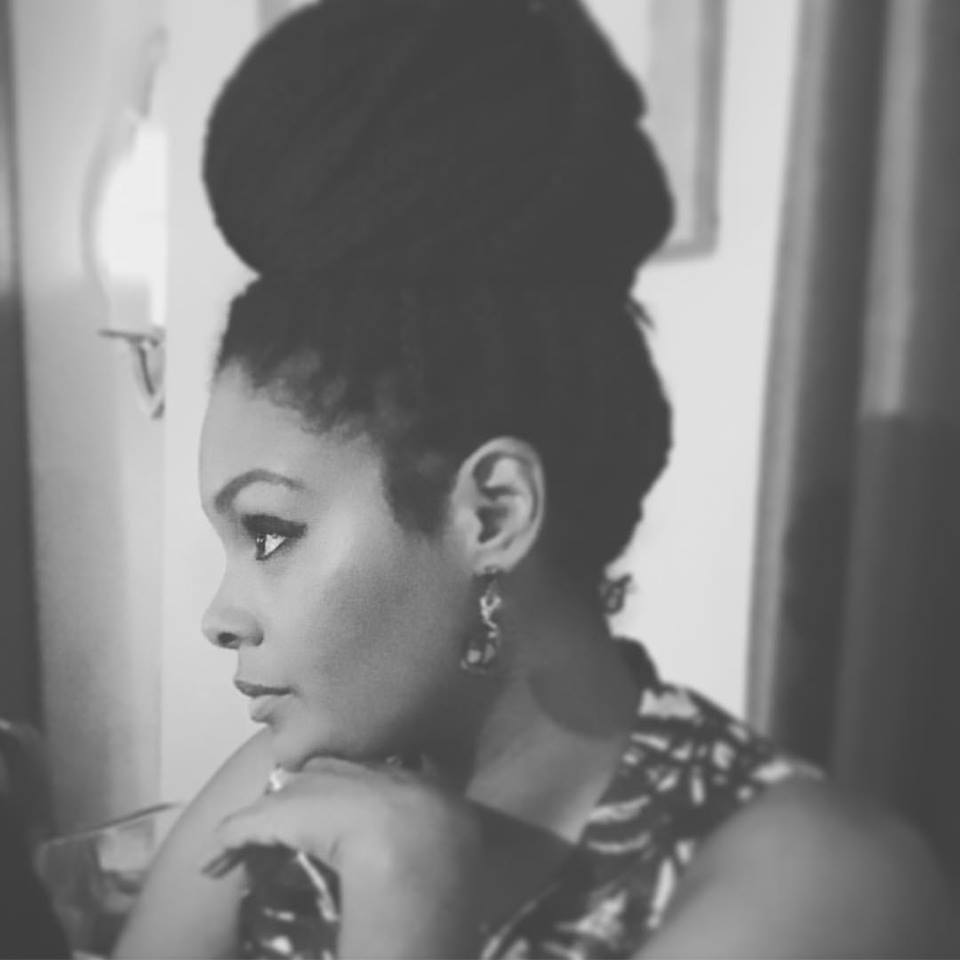 |
|
| Vashti Harrison | |
Vashti Harrison recently became the first Black woman to win the Randolph Caldecott Medal, given for "the most distinguished American picture book for children," for her 2023 book, Big (Little, Brown). Harrison also received two Coretta Scott King honors, in the Illustrator and Author categories.
Big has had a wonderful year. First, it was a finalist for the National Book Award and now it's received the Caldecott Medal as well as two CSK honors. What are you thinking right now?
It's more than I could ever have imagined. The National Book Award was so unexpected and such a wild journey with many authors and illustrators I admire! For the Coretta Scott King committee to give me two honors is incredible--particularly for the writing honor. I feel comfortable with the title of illustrator, but author will always sound foreign. To be recognized for the text in this book is truly humbling.
And the Caldecott? I wished, I hoped for an honor. Never, ever did I believe it was possible to win the Medal. I watched the livestream just to make sure I didn't dream it all up!
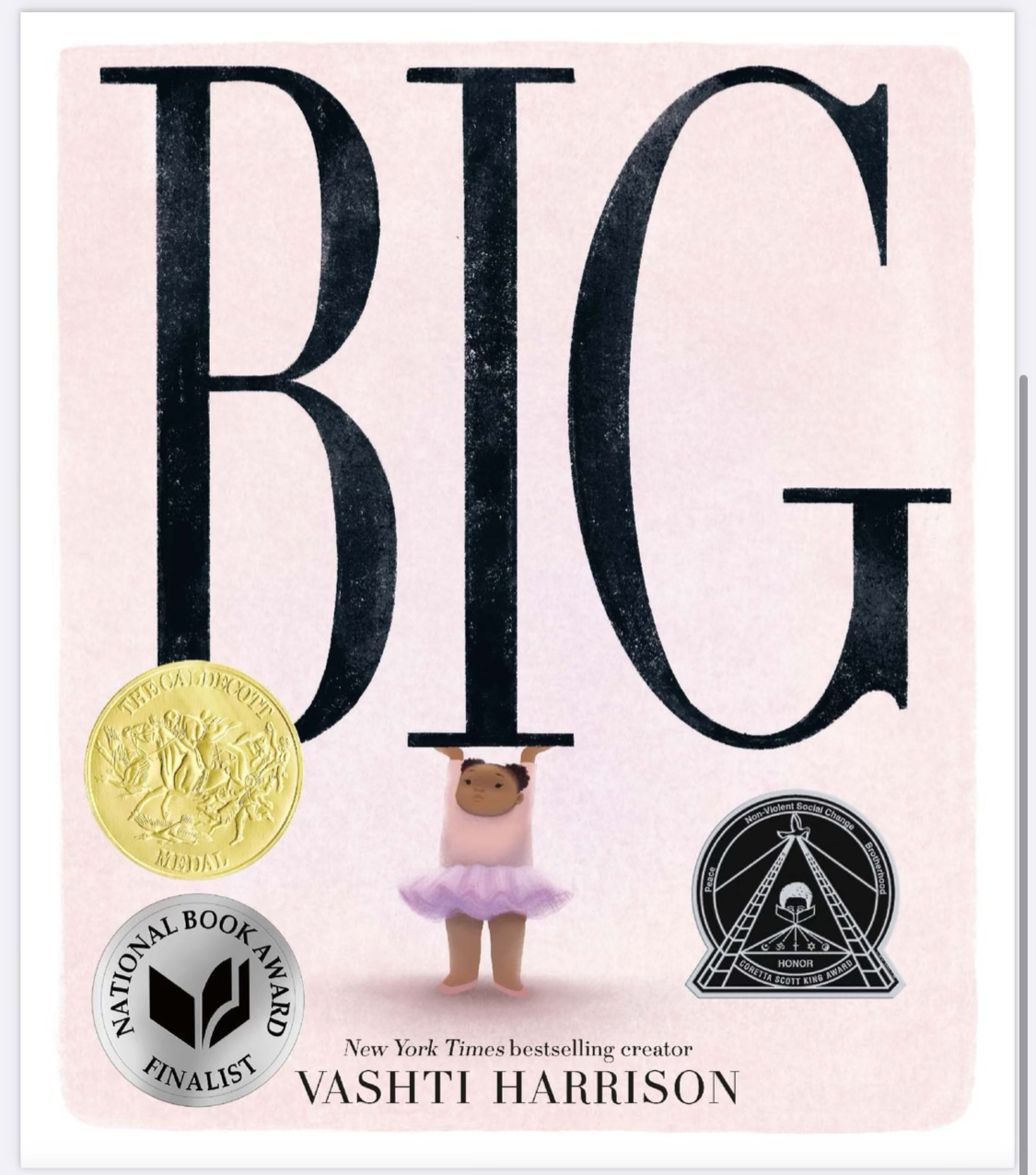 Would you describe Big to our readers?
Would you describe Big to our readers?
Big is the story of a young girl who's experiencing some really BIG feelings, particularly about her body. It traces how the meaning of the word big can change in a girl's life: when you're young, big can be a word of affirmation. But as a girl grows older, it can become something negative. The book tracks how this young girl internalizes some of that negativity, and follows her on her journey to self-love. In the end she reclaims big as just one of the words that define her. I hope the book encourages young readers to know they get to define who they are--no one else gets to decide that for you.
What inspired you to create Big?
Part of this story is inspired by my own childhood and relationship with my body. I started writing it to process many of the experiences and unresolved feelings I still carry. It's an ongoing journey, but I wanted to expand the narrative beyond myself, to create a roadmap for young readers on their own journeys toward self-love. I wanted to make a book about Black girlhood, touching on things that many young Black girls experience in the United States, particularly anti-fat bias and adultification bias.
The illustrations are brilliantly effective: the color palette, the formatting, the use of double-page spreads, that gatefold (!). Did this story come to you fully formed? Or did words or images come to you first?
The images definitely came first. The first thing I drew was a sketch of the lowest point of the book: the girl curled up, back to the viewer, boxed in. No words. Just isolation. I wanted to tell the story of how this girl got here, and how she breaks free. In the beginning I hoped to make a fully wordless book, but there was so much more to say.
The ah-ha moments for me were realizing I could use the gutter and trim size of the book to help support the narrative. That led to me realizing that this is a book about words--I can have the girl literally hold words and hand them back to people. Still, the text is quite spare, so I used color to help communicate her emotions and feelings.
How did you find such an excellent balance of text and illustration?
I went back and forth on edits with my incredible editor and friend Farrin Jacobs. This book only has about 150 words and each one is like a number in a sudoku puzzle. If we put one in, we'd have to take another out. She guided me through this process, especially when I started questioning everything or felt too close to the subject matter.
Have you had the chance to read this book with children?
I've had the opportunity to do school visits across the country, and it's always so amazing to hear how thoughtful and empathetic children are and how they have such a strong sense of justice. The responses have been great. I've seen some amazing classroom projects where they've made posters listing all the positive words that describe themselves, and notes about what to do when they see someone is struggling or being bullied.
What were you hoping to accomplish when writing and illustrating this book?
As much as I hoped this story would be a mirror for young Black girls and a window into this type of experience, I also wanted it to act as an appeal to adults to consider the words we use with and say to children. You never know what's going to stick with a kid. I remember all too well what it was to be that girl, so I want to create space for kids to just be kids, to let their bodies change and grow without adult appraisal or criticism.
Your first book, Little Leaders: Bold Women in Black History, was published in 2017 and you have been rather prolific since then. What have the past seven years been like in publishing?
SEVEN YEARS! I can't believe it's been that long! It started like a whirlwind with Little Leaders, Little Dreamers, and Little Legends. I said yes to so many projects in such a short amount of time: I illustrated four books in 2018 and three came out in 2019. When the pandemic hit and all my events were cancelled, it was really my first moment to slow down. That's when I started doodling my initial thoughts about Big. Those years all blend in my mind, but I think it's been a great seven years for kid lit. My friend, author and editor Winsome Bingham, believes we're in another golden age of picture books. I tend to agree, and am grateful to be able to witness so many diverse, creative, and beautiful books being published. --Siân Gaetano, children's and YA editor, Shelf Awareness
Book Candy
Book Candy
"This is not a letter..." Author Katherine Mansfield was quite fond of this opening for her missives, Letters of Note discovered.
---
Mental Floss shared "15 fascinating facts about S.E. Hinton's The Outsiders."
---
Twenty-one writers were chosen "to provide a snapshot of contemporary literature as part of the 100th anniversary of Queen Mary's Dolls' House," the Guardian reported.
Rediscover
Rediscover: N. Scott Momaday
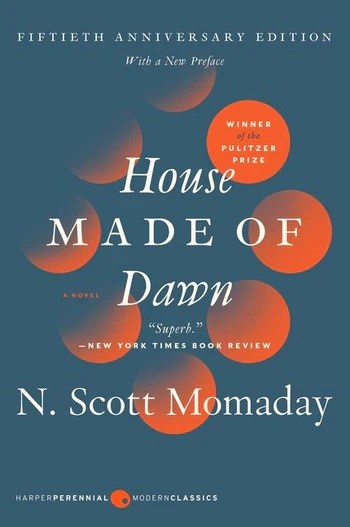 N. Scott Momaday, "whose portrayal of a disaffected World War II veteran's journey to spiritual renewal in his novel House Made of Dawn won a Pulitzer Prize, the first for a Native American author, heralding a more prominent place in contemporary literature for Native writers," died January 24 at age 89, the New York Times reported. Momaday "also wrote critically acclaimed poetry, memoirs and essays. His explorations of identity and self-definition, of the importance of the oral tradition in literature, and of his Kiowa heritage were interwoven with reverent evocations of landscape in passages of soaring lyrical prose."
N. Scott Momaday, "whose portrayal of a disaffected World War II veteran's journey to spiritual renewal in his novel House Made of Dawn won a Pulitzer Prize, the first for a Native American author, heralding a more prominent place in contemporary literature for Native writers," died January 24 at age 89, the New York Times reported. Momaday "also wrote critically acclaimed poetry, memoirs and essays. His explorations of identity and self-definition, of the importance of the oral tradition in literature, and of his Kiowa heritage were interwoven with reverent evocations of landscape in passages of soaring lyrical prose."
Momaday's The Way to Rainy Mountain, a book based on tales told to him by his grandmother, "drew on ethnology, history and personal recollection to reimagine the southward migration of his nomadic Kiowa forebears from the headwaters of the Yellowstone River to their ultimate home near a small rise called Rainy Mountain in Oklahoma," the Times noted.
His other books include The Death of Sitting Bear; Earth Keeper; The Man Made of Words; The Names: A Memoir; Angle of Geese and Other Poems; The Way to Rainy Mountain; The Ancient Child; and Presence of the Sun: Stories and Poems, 1961-1991, which included 60 drawings by the author.
Native American author Sherman Alexie called Momaday "one of the primary foundations for all Native American literature" and credited his Pulitzer with bringing Native writing into the mainstream. "Momaday was a multigenre writer--poetry, fiction, nonfiction--as were nearly all the Native writers of his era," Alexie said. "I write multigenre because Momaday made it seem like it was the thing that Native American writers do. Like it was a natural part of our identity."
House Made of Dawn "was a World War II story that resonated with a generation protesting the Vietnam War," the Associated Press wrote. "In 1969, Momaday became the first Native American to win the fiction Pulitzer, and his novel helped launch a generation of authors, including Leslie Marmon Silko, James Welch and Louise Erdrich. His other admirers would range from the poet Joy Harjo, the country's first Native to be named poet laureate, to the film stars Robert Redford and Jeff Bridges."
"He was a kind of literary father for a lot of us," Harjo said. "He showed how potent and powerful language and words were in shaping our very existence."
Jennifer Civiletto, Momaday's editor at HarperCollins, observed: "Scott was an extraordinary person and an extraordinary poet and writer. He was a singular voice in American literature, and it was an honor and a privilege to work with him. His Kiowa heritage was deeply meaningful to him and he devoted much of his life to celebrating and preserving Native American culture, especially the oral tradition."
In 2007, President George W. Bush presented Momaday with a National Medal of Arts "for his writings and his work that celebrate and preserve Native American art and oral tradition." Other honors included an Academy of American Poets prize and, in 2019, the Dayton Literary Peace Prize. A 50th anniversary edition of House Made of Dawn is available from Harper Perennial Modern Classics.


